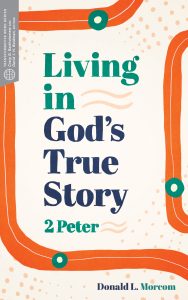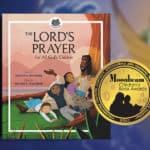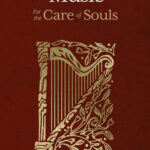
In this excerpt from Living in God’s True Story, Donald L. Morcom shows how 2 Peter acts as an important reminder for Christians as they face challenges to their faith.
All of us live our lives according to a particular story that helps us make sense of the world and our experiences in it, and molds our attitudes and behaviors accordingly. Who am I? Why am I here? Where am I going? What should I do? Our answers to such questions reflect the story we live by. British missionary-theologian Lesslie Newbigin put it like this: “The way we understand human life depends on what conception we have of the human story. What is the real story of which my life is a part?”
Newbigin’s question is urgent because “today, as in the ancient era, the Church is confronted by a host of master narratives that contradict and compete with the gospel. The pressing issue is: Who gets to narrate the world?” Which script or metanarrative or story controls the way we think about the world and our place in it? For some people, it’s consumerism—earn all you can to acquire all you can for your own enjoyment and status. For others, it’s getting to the top of whatever ladder appeals to them, whether corporate, academic, or sporting. Becoming authentic Christ-followers involves leaving behind the stories that our world and our culture have taught us (many of which distill into the secular quest for the “big three”—money, sex, and power) and embracing an altogether new story, God’s story, as revealed to us in the Bible. But there are two particular difficulties we face in making this change. The first is that our culture’s stories aren’t easily loosened from our way of thinking when we become Christ-followers. They continue to influence us despite our new Christian identity, unrecognized and unquestioned, like barnacles stuck tight to a boat’s hull beneath the waterline. The second is that discipleship (which in essence is teaching believers how to live according to this new and different story) is only rarely treated with the seriousness it deserves. The result is that many Christians and churches, like chameleons, simply blend into the surrounding culture and continue to live in accordance with the stories taught us by the world.
What can be done about this unfortunate situation? The answer lies in recognizing that the Bible tells us the true story of the world; it provides the authentic metanarrative by which we learn to live the new life in Christ. Living as Christ-followers means finding our place in this story and cultivating the beliefs, attitudes, and behaviors that fit within it. The apostle Paul declares, “All Scripture is God-breathed and is useful for teaching, rebuking, correcting and training in righteousness” so that we may be “thoroughly equipped for every good work” (2 Tim 3:16–17). We could hardly find a better description of the power of Scripture to transform us than that. Since, as D. L. Moody declared, “The Bible was not given for our information but for our transformation,” we’ll want to make it our priority as Christ-followers to soak in this transformative word and allow it to mold and shape our lives according to the true story of the whole world—God’s story. To put it differently, this is a story not just to be believed, but to be enacted.
“What Kind of People Ought You to Be?”
No less than the other books of the Bible, 2 Peter has an important role to play in reminding us what this true story is (reminding and remembering are repeated themes in 2 Peter). It also explains how we can order our lives in accordance with this true story—it provides practical, ethical answers to the rhetorical question in 2 Peter 3:11, “What kind of people ought you to be?” Peter’s readers were facing many of the challenges that Christ-followers experience today—the proliferation of pseudo-stories (especially by charlatans who want to make money out of their erroneous teachings), the scoffing and mockery of skeptics (in particular about the return of Jesus Christ and the threat of judgment), the defection of some who had previously seemed to be believers, a context of moral ambiguity, and so on. Such challenges were shaking the spiritual foundations of 2 Peter’s readers, confusing and unsettling them. These embattled Christ-followers may well also have been enduring social and perhaps even physical persecution in isolated instances because of their faith. They needed a reminder of the true story of which they were a part. They needed to be reoriented to the truth of their identity and status in Christ. Second Peter plays a vital role in addressing these challenges—in fact, Peter is quite insistent that his main agenda is to remind his readers of this true story (2 Pet 1:12–15; 3:1). They will be in a good position to deal with the challenges they face if this story becomes—and remains—the paradigm for their lives.
General Mitchell International Airport in Milwaukee, Wisconsin understands the unrelenting stress of international air travel. As you emerge, frazzled and disoriented, from the Concourse C security checkpoint, right in front of you is a large sign that says, “Recombobulation Area.” Apparently the idea of a recombobulation area began as a bit of a joke on the part of the airport staff. But it quickly caught on because weary, harried, stressed, discombobulated travelers need a space to take a few deep breaths, gather their thoughts, and begin to get on with real life once more. For the last several hours, they have had an abnormal story imposed on them: “You are a security risk, and we are going to do all we can to expose you.” Perhaps they have even begun to believe this. The recombobulation area gives them the space they need to begin reorienting their lives to normality.
It’s helpful to think of 2 Peter as a recombobulation area for Christ-followers whose lives have been thrown into disarray by the pressures of living in an antagonistic, skeptical, and morally confusing world. Here in 2 Peter we will (re)discover our true identity in Christ, what authentic Christian discipleship looks like, how to recognize and resist false teaching, the Christian’s true hope for the future, and much more. In brief, 2 Peter is a valuable primer on the sort of people we ought to be as Christ-followers.
This post is adapted from Living in God’s True Story: 2 Peter by Donald L. Morcom (Lexham Press, 2021).
With three new titles in the Transformative Word series out last month, we have a fantastic promotion celebrating the whole series. The more you buy, the more you save—up to 40% off!







